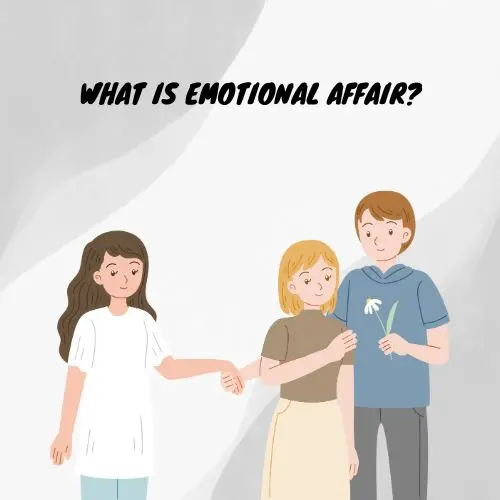Understanding Emotional Affairs
Every relationship comes with conflict resolution, quarrels, and even times when people are no longer talking to each other. However, some behaviors, including emotional affairs, are unethical and compromise essential types of trust.
This article offers definitions of emotional affairs, the causes of these affairs, and the measures that can be taken to prevent the occurrence of such affairs and recover from them. No matter how severe the rift between two families or individuals, harmony, or at least civility, can be achieved where there is a willingness to rebuild that relationship.
Emotional Affair Statistics and Facts
- 65-75% of all affairs are considered emotional rather than physical.
- 91% of those who engage in an emotional affair claim they were not looking to cheat but became close friends first.
- 70% of men and women in otherwise happy marriages risk falling into an emotional affair when their primary relationship lacks intimacy.
- Only 11% of spouses can detect when their partner is having an emotional affair, compared to 49% who can spot an intimate affair.
- Repairing trust after an emotional affair takes 1.5-2 years on average, with a committed effort from both partners through counseling.
What Is an Emotional Affair?

An emotional affair, also known as an emotional cheating, mental affair, or emotional betrayal means the development of an intimate friendship with someone aside from the partner. Unlike an actual affair, emotional affairs are usually about building strong relationships. They are as deep as intimate infidelities even though they do not cover the feelings of a touch.
Key characteristics that define an emotional affair include:
- Adopting a more important consideration of the other person than your partner’s.
- Staying with the other person half of the time rather than your partner.
- Lying or erasing messages, and/or entering forbidden types of contact with a partner.
- To feel more excited with the other person rather than with the partner.
- Reliance on the other person is the main source of emotional comfort.
- Pitched down sexual and emotional closeness or affection from one partner in the relationship.
An emotional affair begins with friendship and over time transforms into an affair when the friendship wears a professional face. This makes them hard to diagnose and treat.
Why Do Emotional Affairs Happen?

Understanding why emotional affairs occur can provide insights into how to prevent them. Common reasons include:
- Lack of intimacy: When for some reason emotional or physical contact is absent in the primary partnership, people look for it elsewhere.
- Unmet emotional needs: It is common for people to complain that their partner does not listen to them, is indifferent, or does not value them.
- Routine and boredom: In the years to come, feelings in a marriage may also fade, so some seek excitement in other places other than their marriage.
- Stress and life pressures: Demands associated with a career, children, financial pressure, etc, force people apart and nonetheless create an opening for emotional cheating.
- Self-esteem issues: Pleasing another person other than the partner serves only to inflate one’s ego for a bit of time.
- Idealization of the other person: People in emotional infidelity engage in a sort of infidelity where they develop another emotional connection other than the real one, there is always a dream about the partner instead of dealing with the realities of the current union.
What Defines an Emotional Affair?
In a nutshell, one can define an emotional affair by a significantly expanded understanding of friendship and romantic links. While people in an emotional affair do not have a sexual relationship their involvement is usually clandestine compromising the honesty and, therefore, the sanctity of the committed relationship. The good thing is that emotional affairs do not engage in physical intimate practices since this can also be as destructive as a physical affair.
How Emotional Affairs Begin
Emotional affairs typically start innocently. They often arise from casual conversations that evolve into deeper discussions. Over time, boundaries are crossed, and the relationship takes on a more intimate tone. Early signs include:
- Confidential information disclosure between the partners.
- The fact that the client contacts the consultant often and at odd hours.
- Happiness or even nervousness, that one gets when with the other person.
- You have the information that the connection is secret from your partner in mind.
Since then, the company has worked to streamline its processes and cut costs, knowing that details are what lead to such huge differences between performances in consecutive quarters and years.
Impact of Emotional Affairs

Emotional affairs can have devastating effects on relationships. Some of the consequences include:
- Betrayal and hurt: This level of emotional investment in another person always feels like being betrayed.
- Loss of intimacy: It is said that the main form of partnership is compromised since one’s passion as an energy source is channeled to other areas.
- Erosion of trust: As much as they show different signs of compatibility, partners may encounter a challenge in trust after realizing an emotional affair.
- Emotional turmoil: Emotional cheating makes individuals experience emotions such as guilt, shame, anger, and sadness.
When one of the partners finds out about the affair, the situation can cause doubts, doubts in the stated relations, and inadequacy. In an affair, the feelings are guilt and confusion for the person involved since they violate the relationship.
Preventing Emotional Affairs

Proactive steps can help prevent emotional affairs and strengthen relationships. Here are some strategies:
- Set clear boundaries: Set standards on how people should treat each other, especially in friendships.
- Communicate openly: Talk with your partner about how you feel, what you are worried about, or what you need.
- Spend quality time together: Take more time in tasks that require contact and closeness.
- Seek counseling: If people feel that something is off, couples therapy gives them skills to face problems.
- Practice gratitude and affection: They stressed the importance of using the words ‘please’ and ‘thank you’ with each other and always telling your partner that you love him or her.
- Address issues early: Those little arguments which you tend to ignore should not be suppressed. With it, answer the challenges with integrity, and resolve them collaboratively.
Rebuilding After an Emotional Affair
If an emotional affair has occurred, recovery is possible with effort, honesty, and commitment. Steps to rebuild trust include:
- Full transparency: Admit that there was an affair and answer your partner’s questions.
- Cut ties with the affair partner: Avoid having any kind of contact with the other person.
- Seek professional help: There are different ways through which therapy can assist the couple in their healing process.
- Demonstrate remorse: Apologize sincerely, and accept that you made a mistake.
- Rebuild intimacy: Learn about your partner and spend as much time as you can to have a connection with your partner.
It takes time and effort from both couples to get over the barriers for the relationship to be rebuilt after an emotional affair. It encompasses admitting and owning up for the pain that one has caused the apology and the assurance that tells the other person that the relationship will be better in the future.
What Is Emotional Infidelity?
Emotional infidelity or even emotional adultery involves a breach of trust by involvement with another person, intimate or otherwise. However, it can be emotionally as deep which causes feelings of exclusion and emotional neglect for the other partner who was betrayed. Emotional cheating threatens the very foundation that a relationship is based on –…emotional security and being the only concern.
How Do Emotional Affairs Start?
Affairs become emotional because they start as casual friendships or communications and later evolve into wrong ones. Ideologically, common topics of discussion foster the kind of closeness that defies formal structures of connection. Such aspects include often texting/calling, sharing histories, and emotional dependency leading the relationship into becoming an affair. Being aware of them allows couples to solve some weak spots before they become severe.
Mental Affair Meaning
Another phrase for cheaters to describe an emotional betrayal is ‘mental affair’. It focuses on the nature of betrayal, stressing the psychological and emotional aspects of this type of relationship, the mental processes within the betrayed, and the dependent feeling. Many, if not more, can be as destructive as the physical intercourses as they intrude into the element of trust and psychological comfort in a relationship.
Takeaway
Emotional affairs, emotional cheating/infidelity, or emotional betrayal undermine the core of relationship bonds. It is established herein what an emotional affair is, why they happen, and how they begin, and in this way, people in relationships could be better placed to prevent the vice. In the case of an experience of ‘emotional cheating,’
It can be possible to work through with honesty, and the help of a professional and determination to restore the relationship. Just remember this – and maybe it sounds trite – every relationship involves work, investment, and a sincere desire to stay linked. Love can only stand the test of time when issues are addressed before they sideline love or get in its way and when being vulnerable is not the thorn in the flesh that wrenches love apart.


Having previously been lied to about who they were with or where they were, how can a betrayed spouse ever reason that the emotional affair did not go physical, and that they are not being lied to still about the scope and level of the betrayal.